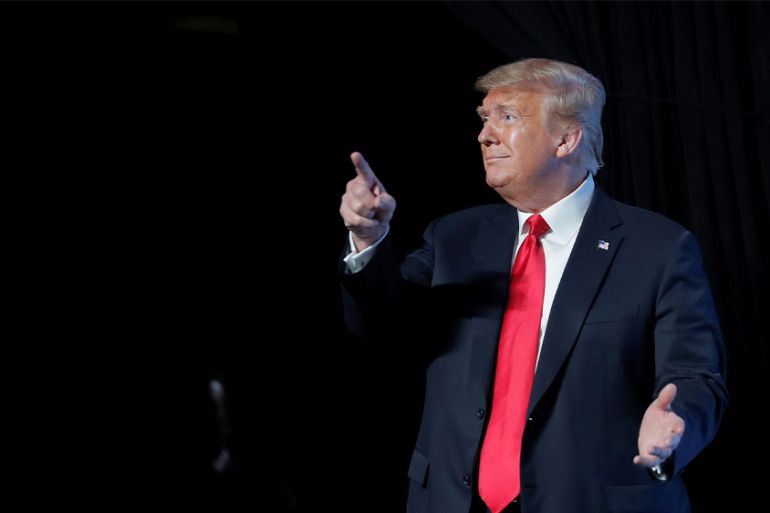US Democrats, Republicans far apart on police reform
Civil rights groups reject Republican proposal amid protests as Trump slams Democrats as weak on law and order.

Facing a watershed political moment, a divided United States Congress is struggling to respond to massive nationwide public demonstrations for police reform as Democrats in the Senate rejected a Republican policing proposal.
The Republican bill was opposed by a broad coalition of US civil rights groups and fell short of a 60-vote threshold needed to advance in the Senate by a 55-45 vote largely on party lines.
Keep reading
list of 4 itemsTrump ally Rudy Giuliani files for bankruptcy following defamation case
‘Insurrection’ should bar Donald Trump from US presidency, lawyers argue
Ex-Proud Boys leader Joseph Biggs sentenced to 17 years for US Capitol riot
At the same time, a Democrat-backed police reform bill is moving rapidly towards passage in the Democrat-controlled US House of Representatives over the opposition of Republicans and President Donald Trump.
Whether Republicans and Democrats can find enough common ground to reach a bipartisan legislative agreement is unclear. Political pressure from the protests is building and public opinion is swinging in support of the Black Lives Matter movement. But the two US parties are far apart on policy and there is a lack of trust between key leaders who have been trading angry rhetoric.
President Trump mocked the Democrats in a campaign speech in Arizona on Tuesday for sympathising with the Black Lives Matter protesters.

“It’s crazy what’s going on. Defund and abolish the police, how is that a good idea?” Trump told an audience of conservative college students assembled in a megachurch in Phoenix.
When Trump first heard the protesters’ slogan “Defund the Police”, Trump said his first thought was: “Oh great, I just won the election.”
Trump and most members of Congress face re-election in November. More than 1,000 Americans are shot and killed each year by police in the US.
Trump said the “20 most dangerous cities in America” are run by Democrats who, he implied, are weak on crime. Murder rates in Chicago and Baltimore are “tougher than Afghanistan, all run by Democrats”, Trump said.
“They want to abolish borders and abolish every police department in the country,” the president claimed.
The question of funding for police is one of the core points of departure between Democrats and Republicans in Congress, and the protesters and civil rights groups.

The Senate Republican bill would authorise nearly $7bn over five years in federal funding for training and grants to state and local police departments. By contrast, the House Democrats’ bill imposes new oversight conditions on federal monies for police and authorises more than $2.5bn for independent investigations of police abuse and federal oversight.
“The large amount of funding that is poured into policing in this country could be better spent on social services, including more community-based social workers, and investment in programs that address the problems that communities face,” said Alphonso David, president of the Human Rights Campaign.
“We have to transform the system, not provide the system with more money and more power,” David said in a conference call with reporters on Tuesday.
The Human Rights Campaign, the National Association for the Advancement of Colored People, the Leadership Conference on Civil and Human Rights, People for the American Way and the National Urban League are among 138 civil rights groups that have come out strongly against the Senate bill.
“It is time now to reimagine public safety in a way that prioritises upfront investments in community-led solutions and resources that centre [around] dignity and respect for everyone,” said Vanita Gupta, president of the Leadership Conference.
“That means not just changing policing practices and culture, but also shrinking the footprint of the criminal legal system in Black and brown communities’ lives and investing in areas that truly make us safer,” Gupta said.

Democrats in the Senate said on Tuesday with civil rights groups vehemently opposed to the Republican bill, they could not agree to go forward with the debate. Instead, they want to use the House bill as a starting point.
“The truth as we know it is that people by the thousands are marching in the streets of America, of every race, every age and gender, in every geographic location, in all the 50 states, unified, demanding we act, demanding that finally something is actually done,” Senator Kamala Harris said at a news conference on Tuesday.
“There is an opportunity in this moment,” said Harris, who is one of three African Americans in the Senate. But she added: “I do not intend to be part of a discussion where some might suggest Democrats are trying to stand in the way of police reform.”
And yet that is what Republicans are saying as they lamented the unwillingness of Democrats to support even debating their proposed measure.
“The only thing that’s blocking this right now is the Senate Democrats,” said Republican leader Mitch McConnell. Democrats just “want to use this opportunity for nothing more than to score political points.”
Civil rights groups hope that after Democrats reject the Republican bill in the vote on Wednesday, that “McConnell will come back with another bill that has more accountability and things that the protesters want”, Ed Chung, vice president for criminal justice reform at the Center for American Progress, told Al Jazeera.
